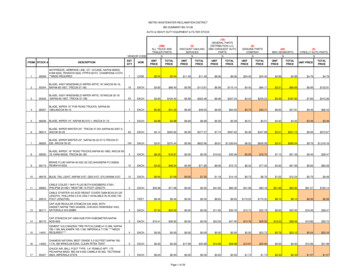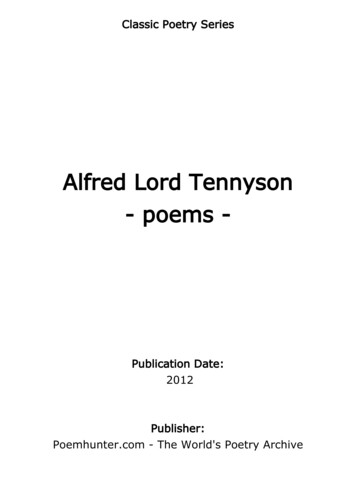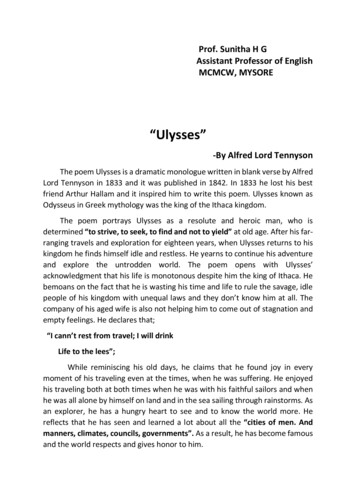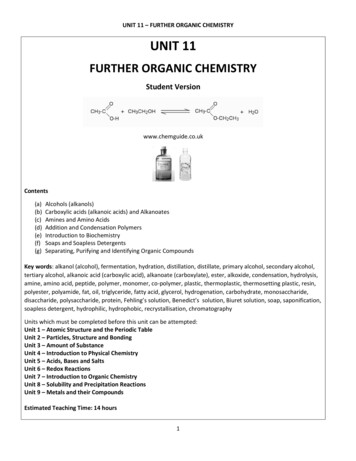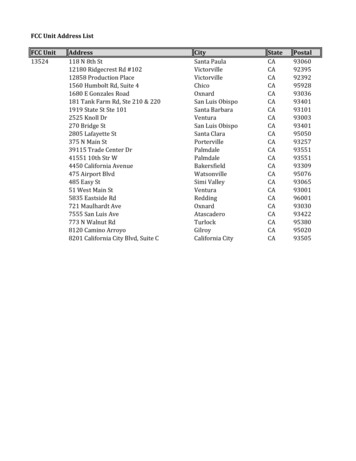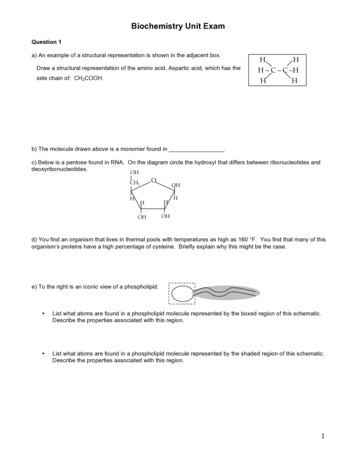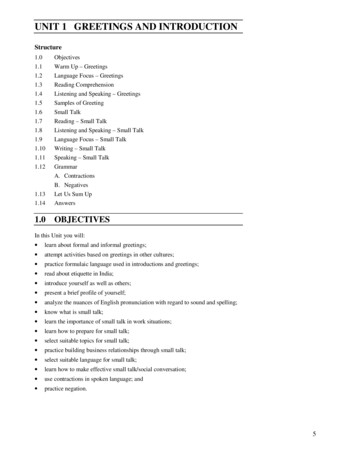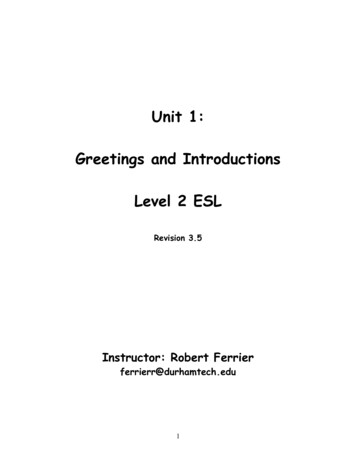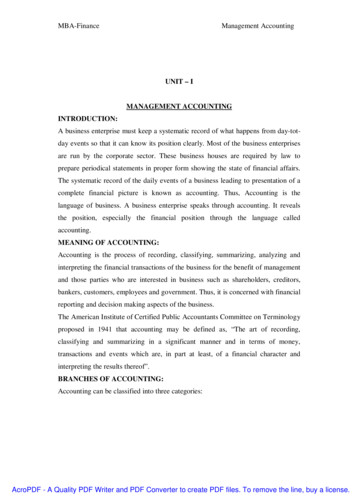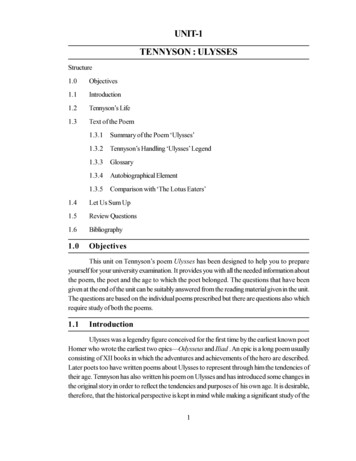
Transcription
UNIT-1TENNYSON : nyson’s Life1.3Text of the Poem1.3.1Summary of the Poem ‘Ulysses’1.3.2Tennyson’s Handling ‘Ulysses’ Legend1.3.3Glossary1.3.4Autobiographical Element1.3.5Comparison with ‘The Lotus Eaters’1.4Let Us Sum Up1.5Review Questions1.6Bibliography1.0ObjectivesThis unit on Tennyson’s poem Ulysses has been designed to help you to prepareyourself for your university examination. It provides you with all the needed information aboutthe poem, the poet and the age to which the poet belonged. The questions that have beengiven at the end of the unit can be suitably answered from the reading material given in the unit.The questions are based on the individual poems prescribed but there are questions also whichrequire study of both the poems.1.1IntroductionUlysses was a legendry figure conceived for the first time by the earliest known poetHomer who wrote the earliest two epics––Odysseus and Iliad . An epic is a long poem usuallyconsisting of XII books in which the adventures and achievements of the hero are described.Later poets too have written poems about Ulysses to represent through him the tendencies oftheir age. Tennyson has also written his poem on Ulysses and has introduced some changes inthe original story in order to reflect the tendencies and purposes of his own age. It is desirable,therefore, that the historical perspective is kept in mind while making a significant study of the1
poem.1.2Tennyson’s LifeAlfred Tennyson, also known as the first Baron Tennyson, was born on October 61809 and was also the Poet Laureate of Great Britain. He remains the most popular and oftquoted English poet next to Shakespeare.Tennyson’s best work is said to be his In Memoriam which was written in the memoryof his friend Arthur Hallam who was also a poet and Tennyson’s classmate at Trinity College,Cambridge but died quite early in the year 1833 of cerebral hemorrhage. Tennyson is alsoknown by his famous work Idylls of the King written in 1885 which is a collection of narrative poems based on the life of king Arthur and the Arthurian tales. Its subject has been takenfrom Sir Thomas Malory’s tales about king Arthur. It was dedicated to Prince Albert who wasthe Queen’s consort.Earlier it has been said that Tennyson is the most commonly quoted poet afterShakespeare and some of his best quoted lines are :1.Better to have loved and lost /than never to have loved at all.2.My strength is as the strength of ten/Because my heart is pure .3.Theirs not to reason why/Theirs but to do and die4.Come into the garden, O Maud.5.Nature, red in tooth and claw.Tennyson, born at Somersby, was the son of a rector and he was the fourth of twelvechildren and a descendant about ten generation back of Edmond, the Duke of Somerset andfurther back to Edward III of England . Tennyson’s father gave great attention to the educationand training of his children. With two of his elder brothers, Charles and Fredrick, he startedwriting poems at a very early age and all three published them when Alfred was only 17 yearsof age. For his education Tennyson first went to Louth Grammar School from 1816-1820 andthen to Scaitcliff School and from there to King Edward VI Grammar School, Louth. In 1828he entered Trinity College, Cambridge and there he met his best friend Arthur Henry Hallam.In 1830 he published his Poems Chiefly Lyrical that included his two celebrated poems‘Claribel’ and ‘Marianna’. The verses soon became popular and attracted the attention of wellknown literary figures including that of S.T. Coleridge.In 1831 Tennyson’s father died and he was required to leave Cambridge to look afterhis widowed mother and the large family of children. His friend Arthur Hallam came to staythere for some time and became engaged to Tennyson’s sister, Emilia. In 1833 Tennysonpublished the second volume of his poems which was not well received by the public. In thesame year came the news of the death of his friend Hallam which proved a severe blow to2
Tennyson. In 1842 while living modestly in London Tennyson published two volumes of Poems which included poems of such lasting fame as that of “Locksley Hall” and ‘Tithonus’ and‘Ulysses’ In 1850 he published his best work In Memoriam which he dedicated to Hallamand the same year following Wordsworth’s death, Tennyson was appointed the Poet Laureatethe position he continued till his death.As a Poet Laureate, Tennyson wrote mostly ordinary verses such as that of greeting toAlexandra of Denmark who arrived in Britain to marry the would be King Edward VII in1853. He produced also one of his best known poems ‘The Charge of the Light Brigade’which was “a dramatic tribute to the British cavalrymen involved in an ill-advised charge on25th October 1854 during the Crimean War”. His other poems as poet laureate include ‘Odeon the death of Duke of Wellingdon’ and also ‘Ode Sung at the opening of the InternationalExhibition’.Tennyson was greatly admired by Queen Victoria who in 1884 made him BaronTennyson. In 1883 he was offered a peerage as a result of which he entered the House ofLords on March 11, 1884. Towards the end of his life Tennyson wrote that his ‘religious’beliefs also defied conventions, leading towards agnosticism and in In Memoriam he wrotethat “there lives more faith in honest doubt, believe me than in half of the creeds”. Other linesindicative of his loss of faith are ‘The churches have killed their Christ’ (Maud 1855) and inLocksley Hall he wrote, “Christians love among the churches, look’d the twain of heathenhate’’ and in his play Becket he wrote ‘We are self uncertain creatures and we may, Yea, evenwhen we know not, mix our spites and private hates with our defence of Heaven’ and in hisDiary he wrote, ‘I believe in Pantheism of a sort’. He continued writing for a long time and atthe age of 83 died in 1892.1.3Text of the poemUlyssesAlfred Lord TennysonIt little profits that an idle king,By this still hearth, among these barren crags,Matched with an aged wife, I mete and doleUnequal laws unto a savage race,That hoard, and sleep, and feed, and know not me.I cannot rest from travel: I will drinkLife to the lees: all times I have enjoyedGreatly, have suffered greatly, both with thoseThat loved me, and alone; on shore, and whenThrough scudding drifts the rainy HyadesVest the dim sea: I am become a name;3
For always roaming with a hungry heartMuch have I seen and known; cities of menAnd manners, climates, councils, governments,Myself not least, but honoured of them all;And drunk delight of battle with my peers;Far on the ringing plains of windy Troy.I am part of all that I have met;Yet all experience is an arch wherethroughGleams that untravelled world, whose margin fadesFor ever and for ever when I move.How dull it is to pause, to make an end,To rust unburnished, not to shine in use!As though to breath were life. Life piled on lifeWere all to little, and of one to meLittle remains: but every hour is savedFrom that eternal silence, something more,A bringer of new things; and vile it wereFor some three suns to store and hoard myself,And this gray spirit yearning in desireTo follow knowledge like a sinking star,Beyond the utmost bound of human thought.This is my son, mine own Telemachus,To whom I leave the scepter and the isleWell-loved of me, discerning to fulfillThis labour, by slow prudence to make mildA rugged people, and through soft degreesSubdue them to the useful and the good.Most blameless is he, centered in the sphereOf common duties, decent not to failIn offices of tenderness, and payMeet adoration to my household gods,When I am gone. He works his work, I mine.There lies the port; the vessel puffs her sail:There gloom the dark broad seas. My mariners,Souls that have toiled, and wrought, and thought with meThat ever with a frolic welcome tookThe thunder and the sunshine, and opposedFree hearts, free foreheads you and I are old;Old age had yet his honour and his toil;4
Death closes all: but something ere the end,Some work of noble note, may yet be done,Not unbecoming men that strove with Gods.The lights begin to twinkle from the rocks:The long day wanes: the slow moon climbs: the deepMoans round with many voices. Come, my friends,’Tis not too late to seek a newer world.Push off, and sitting well in order smiteThe sounding furrows; for my purpose holdsTo sail beyond the sunset, and the bathsOf all the western stars, until I die.It may be that the gulfs will wash us down:It may be we shall touch the Happy Isles,And see the great Achilles, whom we knew.Though much is taken, much abides; and thoughWe are not now that strength which in the old daysMoved earth and heaven; that which we are, we are,One equal-temper of heroic hearts,Made weak by time and fate, but strong in willTo strive, to seek, to find, and not to yield.1.3.1 Summary of the PoemUlysses is a legendary figure in Tennyson’s poem by that name and the poem is in themonologue form. In this poem Ulysses himself is the speaker and he seems to be addressinghis mariners who have been his companions in the Trojan War. His son Telemachus seems tobe standing by him and Ulysses himself is the king of Ithaca.Ulysses is old now in age but not in his spirit. He is greatly dissatisfied with his presentcondition as the king of Ithaca, an Island, and his subjects are rugged and savage in the sensethat they do not value the importance of work and justice in life. They are the people who only“Hoard, and sleep, and feed and know not me.” He further informs that his wife is old nowand his son is young enough to take over the responsibility of his father’s kingdom and family.Ulysses has been a great explorer and has made great discoveries. Though old now his spirityearns for new adventures abroad. He says that he has been to different places of differentkinds of people and of different “manners, climates, councils, governments” and all thosepeople have paid honour and tribute to him as a result of which his name has become asubstitute for great adventurer and explorer. He has proved his exploits in the Trojan war andas an explorer he has found that the world is too large to be measured by a single life and thatthe more he explores the more of it remains to be discovered. He says that his spirit is indefatigable and for him old age is not the time for rest and rusting but to gain more experiences in life.He is of the opinion that life means experiences and the more one gathers them the greater in5
age one becomes.He then contrasts his present life with that which has been and therefore he wishes “toshine in use”. He also says that he will not be alive for many more years and wishes that beforehe is laid to rest he wants to become a discoverer of new things. His spirits are very high andhis ambition is to follow knowledge even beyond the seas.He also says that in his absence his son Telemachus will be the king of Ithaca and hewill try in every possible way to civilise his rugged and savage people by slow degrees and tryto make them useful and good. Moreover, his son knows what his duties towards his familyare and he will also properly worship his household gods. While he goes abroad his son willremain at home and perform all the duties that are expected of the head of a family. All preparations for Ulysses’s departure have been completed––there lies the port and the sales of hisship are open and full of air and his mariners are prepared to sail with him to meet any andevery kind of adventure that comes their way. His mariners are undaunted and have neverknown any fear. They have been “ free hearts, free foreheads” and though as old as he himselfis yet they and he are alike in spirits. Like him his mariners also believe that though death is anunfailing certainty yet before death and even in old age “some work of noble note” can yet bedone for these mariners were the people who in the past “strove with goods”.He says that all is ready for his departure. It is the evening time, the moon is visible inthe sky and the sea seems to invite the mariners with many kinds of noise. Ulysses asks hismariners to get ready immediately for “pushing off”, because his ambition is to reach the legendry “Happy isles” where he hopes to see his great ancestor Achilles face to face. He nowregrets that he and his mariners are now not in possession of that energy and vigour that wastheirs in their former youthful days when they could move “earth and heaven”. They have nowbeen considerably weakened both by fate and by time but for them, there is no cessation fromactivity. They are all of “One equal temper of heroic hearts” and by defying both time and fatethey must continue their old mission “to strive, to seek, to find and not to yield”.1.3.2 Tennyson’s Handing ‘Ulysses’ LegendTennyson has taken the material of his narrative from many sources. Ulysses is alegendary figure and the first introduction of him one finds in Homer’s epic poem Odysseus(the Greek name for Ulysses) and many later poets after Homer have taken his character fortreatment and though the basic character is from Homer’s account of him but the later poetsand dramatists have recounted his exploits and character to suit their own vision of him. Amongthe later poets and dramatists are those of Euripides, Horace, Dante, Shakespeare and AlexanderPope. Tennyson’s presents the Victorian account of him.The broad outlines of the Ulysses myth have been taken from Homer’s Odysseus. Inthe eleventh book of the epic, the prophet Tiresias who was blind but had the vision of seeinginto future, relates that having been away and after many trials and voyages Ulysses will come6
back to his Ithaca but soon after undertake a new and mysterious Journey and meet a peacefuland unheroic death somewhere on the sea itself. Tennyson’s account, however, differs fromHomer’s in several ways. Tennyson’s Ulysses takes no interest in public affairs and is indifferent to his family duties. As a king of Ithaca he is m
1.3.1 Summary of the Poem Ulysses is a legendary figure in Tennyson’s poem by that name and the poem is in the monologue form. In this poem Ulysses himself is the speaker and he seems to be addressing his mariners who have been his companions in the Trojan War. His son Telemachus seems to be standing by him and Ulysses himself is the king of Ithaca. Ulysses is old now in age but not in

